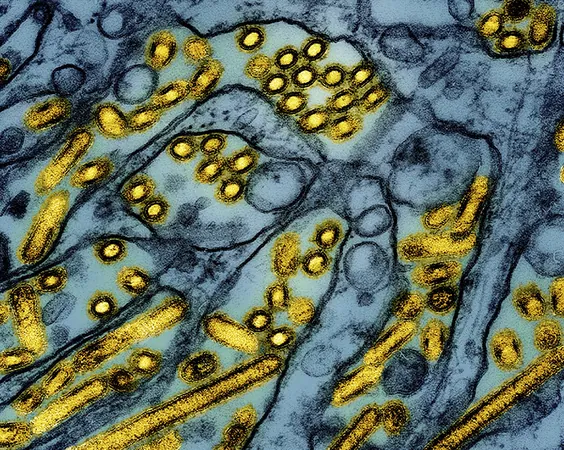
Alarm Bells Sound as 'Presumptive' Bird Flu Case Emerges in Delaware Poultry Flock
2025-01-04
Author: Yan
Alarm Bells Sound as 'Presumptive' Bird Flu Case Emerges in Delaware Poultry Flock
In a recent development, a commercial flock of broiler chickens in Delaware has tested positive for what officials are calling a "presumptive" case of H5 bird flu. This alarming discovery has raised significant concerns across the highly lucrative poultry industry, particularly in neighboring Maryland.
The positive result, reported by state officials early Friday, follows a previous alarming finding of the virus in wild Snow Geese in the vicinity of the Prime Hook National Wildlife Refuge in Milton, Delaware. Just a week prior, the U.S. Department of Agriculture indicated that several wild birds, primarily Snow Geese, had been found dead in the region.
While this case is labelled "presumptive," further confirmation is anticipated from the National Veterinary Services Laboratory, where rigorous testing is conducted. The situation is being treated with utmost seriousness, considering the highly contagious nature of the H5 strain of bird flu.
To mitigate potential risks, poultry farmers in both Delaware and Maryland, including those with small non-commercial flocks, are being urged to step up their biosecurity measures. The Maryland Department of Agriculture has emphasized in communications that enhanced biosecurity protocols are imperative for all poultry operations.
In response to the bird flu threat, Maryland's state parks are also implementing precautionary measures. Aviaries in seven state parks, which house various raptors such as owls and hawks, are undergoing operational adjustments to restrict public access. Sarah Milbourne, a ranger and coordinator for the Scales and Tales program, confirmed that the parks have transitioned to a Phase II protocol, limiting visitation areas around the aviaries, thereby reducing birds' potential exposure to the virus.
The Scales and Tales program aims to educate the public about raptors, but for now, the birds will be kept at a safe distance from visitors to prevent any risk of infection. Should conditions worsen, a Phase III response may be activated, which could see staff donning masks and protective gear when interacting with the raptors.
As the spread of bird flu raises fears throughout the agriculture sector, the health of both poultry and wild bird populations is front and center. Authorities are urging all poultry owners and wildlife enthusiasts to remain observant and proactive in safeguarding against this potentially devastating outbreak.
Stay tuned as we continue to monitor this evolving story that could have major implications for the poultry industry!







 Brasil (PT)
Brasil (PT)
 Canada (EN)
Canada (EN)
 Chile (ES)
Chile (ES)
 Česko (CS)
Česko (CS)
 대한민국 (KO)
대한민국 (KO)
 España (ES)
España (ES)
 France (FR)
France (FR)
 Hong Kong (EN)
Hong Kong (EN)
 Italia (IT)
Italia (IT)
 日本 (JA)
日本 (JA)
 Magyarország (HU)
Magyarország (HU)
 Norge (NO)
Norge (NO)
 Polska (PL)
Polska (PL)
 Schweiz (DE)
Schweiz (DE)
 Singapore (EN)
Singapore (EN)
 Sverige (SV)
Sverige (SV)
 Suomi (FI)
Suomi (FI)
 Türkiye (TR)
Türkiye (TR)
 الإمارات العربية المتحدة (AR)
الإمارات العربية المتحدة (AR)